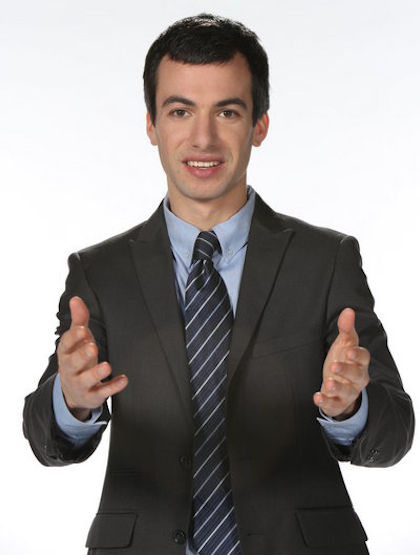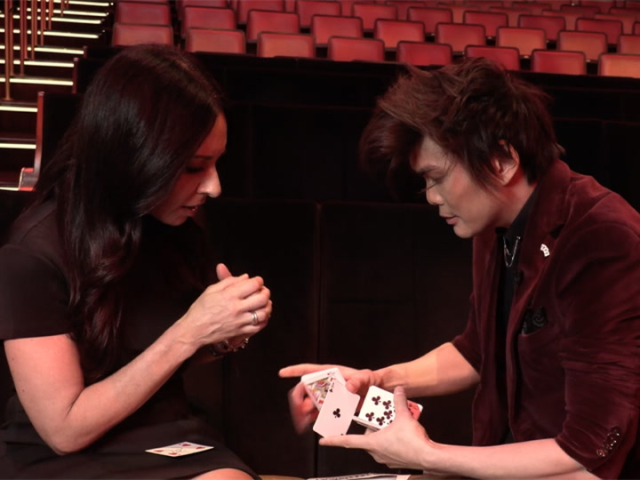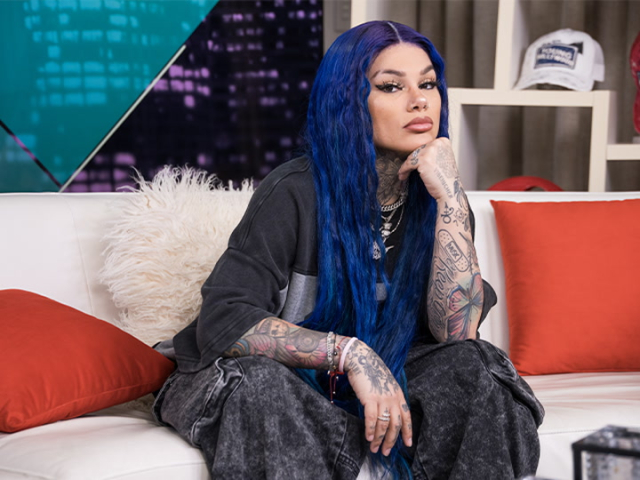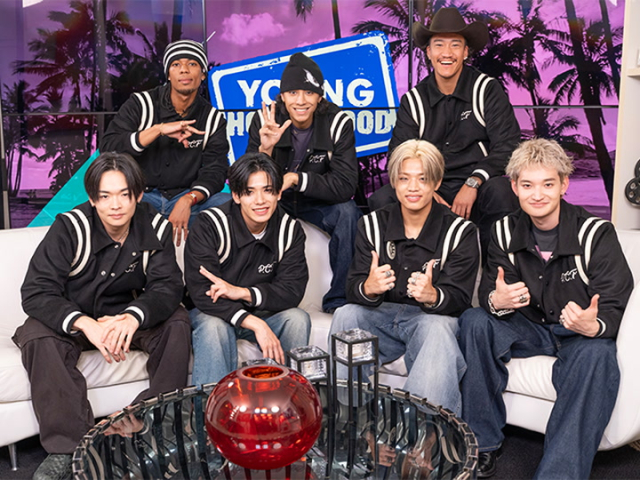Chatting with: “Nathan for You” Creator Nathan Fielder

Remember back in February when a Dumb Starbucks popped up out of nowhere in Los Angeles and then disappeared almost as quickly as it came? Well, we're finally going to find out what that was all about.
The stunt was the brainchild of “Nathan for You” creator and star Nathan Fielder. In the show, whose second season premieres tonight on Comedy Central at 10:30pm, Fielder helps small businesses by implementing rather unusual promotions and stunts. In Season One, Fielder introduced a poo-flavored frozen yogurt to a frozen yogurt shop, hired actors for a funeral home (to make the dead seem more popular), and even staged his own stunt known as “The Claw”. The stakes are raised for Season Two, where Fielder opens the aforementioned Dumb Starbucks and even receives an onscreen smooch.
Originally from Canada, Fielder first developed an interest in comedy when he joined his high school’s improv team (fun fact: Seth Rogen was a fellow member!). He went on to study Business, which would give him the savvy needed for “Nathan for You”, which first appeared as part of the CBC comedy series “This Hour Has 22 Minutes”. Over the past few months of filming Season Two, Fielder has kept in touch with his fans by constructing “social experiments” on Twitter and posting some rather scandalous photos on Instagram.
Fielder has a delightful self-deprecating humor and is unfailingly polite (he is Canadian, after all). Check out our chat below:
YH: What can we look forward to seeing in Season 2 of “Nathan for You”?
NF: The one thing I don’t like to do is repeat myself, so we head into new territory this year. We deal with the supernatural this year, which we never did in Season One. There is some legal stuff this year we came up against. There is an entire episode on the full story of Dumb Starbucks. No one really knows the genesis of that and how that came about. No one knows the set-up and the fall-out. There is a full episode around that, and that rode a very fine legal line. I help a liquor store find a way to sell alcohol to minors. [laughs] It seems like we came up against the law a bit more closely this year. In the first season, a lot of the business owners were reluctant to try the ideas, whereas this year we had one or two of the owners who really got into it even more so than me, which is a really interesting change. In one of them, I had to stop the guy from going as far as he wanted to go. That’s an interesting area we end up going into. Those were some surprising moments.
YH: What exactly is the origin of Dumb Starbucks?
NF: It initially came as a way to help another business. I wasn’t going to open it on my own. It came as a way to help them. To build a brand from scratch can take 10 years or more, and it takes a lot of money and time. But if you could use someone else’s recognizable name, then legally you will have instant brand recognition and be popular immediately. So that was the idea -- to use parody law, and just by putting the word “dumb” in really small letters, you could have people coming in thinking it was a Starbucks, legally. It was a way to bring brand recognition to a new coffee shop. But some unexpected twists in the story happen, which ended up with me having to open it in a different location. It’s a full episode. I am fairly modest about things, but I do think that this might be the greatest story ever told.
YH: Where did the idea for your particular brand of comedy come from?
NF: When I was younger, I was a bit unaware of how I came across to people. I went through a phase where I started asking people what they thought of me when they met me, and it surprised me that I made people feel more uncomfortable than I thought I did. [laughs] At a certain point, I decided to embrace that. A lot of what I do stems from real moments and interactions that I’ve had with people in my life. That’s where one of my biggest personal struggles comes from, interacting with people. I’ve gotten a lot better at it. But once I saw that I was sort of bad at that sort of stuff, I started to see the humor in it. I realized that there’s more to it, where this stuff is not only interesting to watch, but when people are thrown off by me, it brings out something in them, which is interesting to watch (for the viewer), and it can be very endearing to see people handle someone like me. I’m amazed by people who aren’t awkward, and I watch those people in awe who can navigate comfortably through small talk or general conversations.
YH: Did you have a favorite segment from last season?
NF: I came out of certain segments, like the gas station segment or “The Hunk”, with some interesting emotions. For the gas station segment, we created this very elaborate rebate with people camping overnight in order to save 50% on gas. In the other one, I created this fake dating show to help me overcome general nervousness around women through immersion therapy. Those experiences, when I was done with them, I felt surreal, like I was in another world. I don’t quite know why. Maybe because I was shooting a show but also camping overnight with these people. It was very strange for me. Those episodes were fun. They're also so much longer than what’s actually in the show, there’s so much more stuff than what is actually shown. Those episodes are reminders of those experiences for me.
YH: How do you not break character when you are interacting with the businesses?
NF: When I’m trying to convince someone of the idea, it’s important that I take it seriously, or the whole idea is over. I need to sell them on the benefit of doing this. I need to make sure there is some way this can help their business. I have to embrace that part of my thinking and not think about the silliness. When other people say something very strange or funny, I do these strange things with my face where I think I’m about to laugh. I will stretch my mouth open to cover a smile, and then I will pretend to reach back to pick something out of my teeth. That’s one of my ways to mask it. But sometimes, things are so crazy I end up laughing. It’s human to laugh, and I don’t think it’s strange to the people I’m talking to, because people laugh at weird things all the time.
YH: On Twitter, you have pulled quite a few social experiments. For instance, you have suggested to your followers to "text your parents pretending to be a drug dealer." Have you ever had any repercussions from the tweets, or are they usually just good fun?
NF: I didn’t know if there were repercussions afterwards. Personally, no, because I didn’t interact with any of those people. I assume that if you know your parents well enough, you will know how to manage them if they got mad. I think we did have a lot of kids who had to show their parents the actual link to the tweet, so that they knew it wasn’t real. I did post a thing after where I said if your parents are mad, have them call this phone number and I’ll explain to them that it is just a joke. On the phone number, when they would call, I had a message that said, “Hi, you’ve reached Nathan. Leave a message. Oh, and if you’re calling because your kid told you to call about some drug thing, I’ve been getting a lot of calls about that. I have no idea what that’s about.” I got to mess with them. I hope no one got in trouble! If someone did get in trouble, this probably wasn’t the first time. I think there were some kids who did it who actually had a known history of dealing drugs, so I didn’t think it worked for them. It was just a reminder that they actually do do that. I think some kids got out of it by saying “gram is short for grammar books”, and their parents thought they had misinterpreted it.
YH: Do you notice a difference between interacting with the public in Los Angeles versus in Canada?
NF: In Los Angeles, more people want to be on camera. In Canada, I don’t think many people want to be on camera. It’s definitely easier to find those regular types of people who have no desire to be famous in Canada, which are the people I like shooting with the most. That’s the main difference. But I think that people are people, and there are a variety of personalities in every city. I think that people out here are just as weird and out there as Canadians can be. I think that Canadians can be a bit more inward. For example, in my first experience coming to L.A., I looked a little bit lost. I didn’t know where I was. I didn’t ask anyone for directions, but I guess I just seemed like I was lost because someone came up to me and said, "You look lost. Can I help you? I can look up where you want to go on my phone." It was so kind. I couldn’t picture that happening where I grew up. It was just very nice. I thought that people in L.A. were very nice. However, I could not believe how people drove on the highway here. I was freaked out. I saw dents in cars I had never seen before!
YH: You are also a magician. What inspired you to get into magic?
NF: I don’t really do magic anymore, but I did do it for several years. I think every kid goes through a magic phase. Early on in high school, I went to my friend’s house and he was into magic. He showed me this trick where he made a card disappear behind his head and I was so blown away by it, that I forced him to teach me how to do it. He did, and I practiced that for a long time. After that, I got obsessed with it. I joined the local magic circle. I went to magic shops. I always carried around a deck of cards with me and practiced all the time. I worked in a magic circle. I performed wherever I could. I even worked in a magic shop. I got really into it between ages 13-18.
YH: What advice would you give to fellow comedians?
NF: I don’t know how much this will appeal to your readers, the Young Hollywood audience; I’ve got a lot of gray hairs. [laughs] I’m not good at giving advice, but the best advice I’ve heard and is true, is to keep making stuff a lot, and be nice to everyone. I don’t know why things happen the way they do. I played a trick on myself where I told myself I was going to give myself 10 years to try to make a decent living doing this, and if I can’t do it, I’m going to quit. In the beginning, I gave myself this timeline because I didn’t have any expectations for doing stuff right away. I think it allowed me to do stuff and suck for the first five years, because I didn’t have any expectations. I will suck for a long time and then I’ll be good after that. I set my expectations really low at first. But it sucks early on because there are so many situations where you just bomb and things go terribly, and you just want to quit. But if you can outlast those periods, you’ll make it. When people like the stuff I do, I feel like I’m pulling off this great trick. I don’t know why people like the stuff I do. I know how unfunny I actually am, like on this call, I’m not making jokes, I’m not that funny of a person. I don’t know how I’m pulling this off. I just have to keep my mouth shut and not ruin this. You have to keep going. If you quit, you do fail.
You can follow Nathan's adventures on Twitter, and be sure to tune in for the Season 2 premiere of "Nathan For You" tonight!
(Photo via PMK-BNC)
- Sarah Osman, YH Staff



